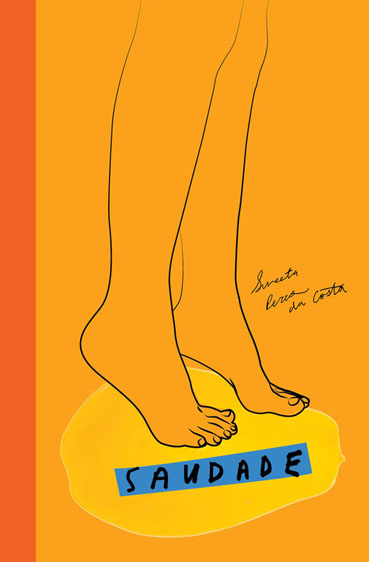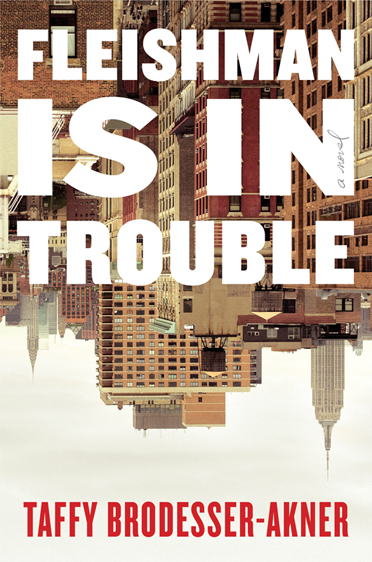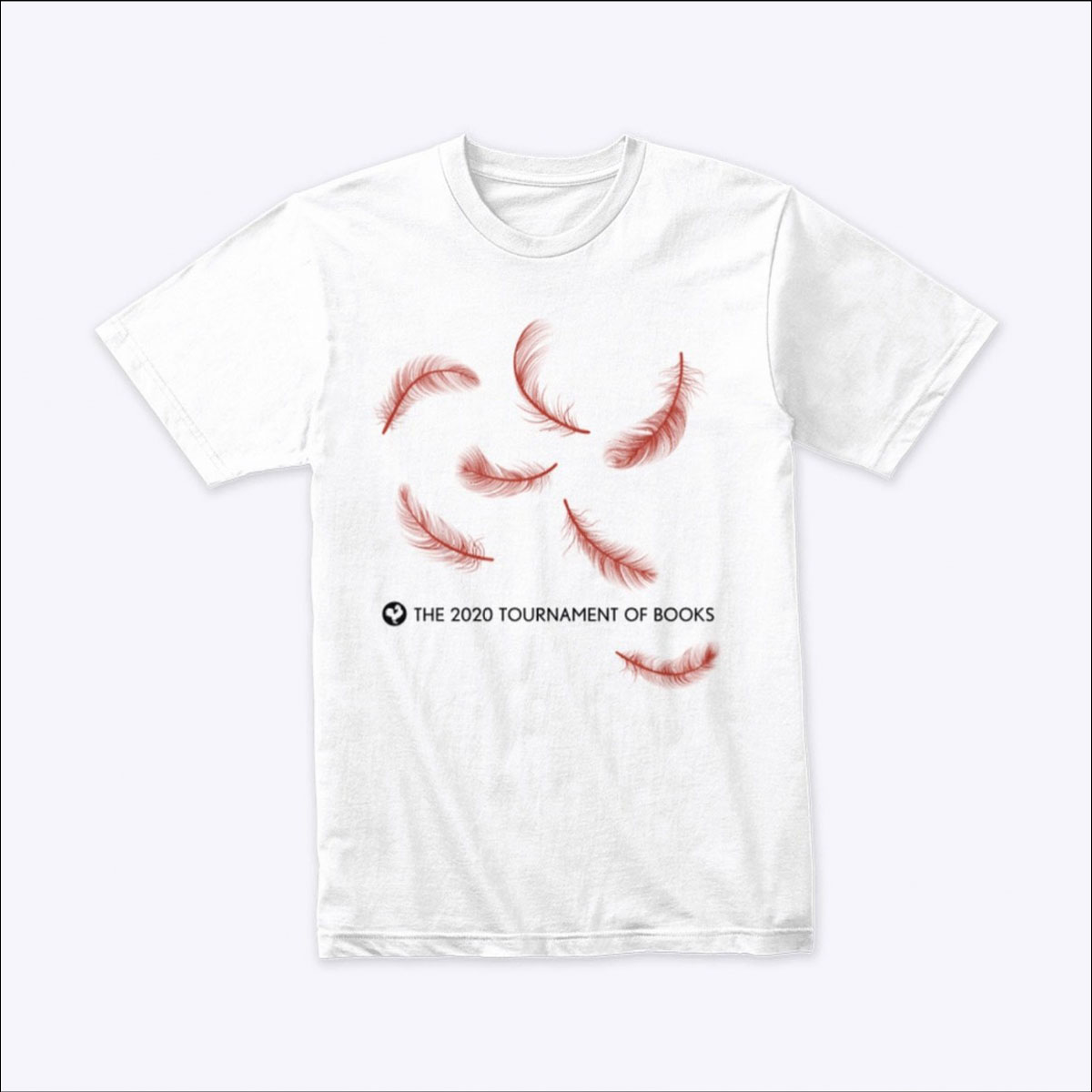-
March 19, 2020
Quarterfinals
-
Suneeta Peres da Costa
4Saudade
v.
3Fleishman Is in TroubleTaffy Brodesser-Akner
-
Judged by
Maret Orliss
When I agreed to be a judge for the Tournament of Books I was excited, and secretly hoped that the books I’d be assigned would both allow me to read a few titles I’d been meaning to get to, and I also hoped that the winner of my matchup would be obvious to me. It wasn’t that I wanted to read something “bad,” it was more that I didn’t want to turn my judgment into my interior monologue about what makes a book good; what’s more important, a book that speaks to you personally or that is incredibly well crafted; is my job here to be a reader and or a critic; what makes criticism relevant; and why did I agree to do this in the first place? I didn’t want to be in that situation, and yet here I am, a person who is not a professional writer or critic, who spent a week whining about all of this to friends, saying extremely annoying things like, “how am I supposed to do this, writing is HARD,” to people who write professionally on the regular. And then, just like when I used to write my papers in high school and college the day before they were due, I waited until my deadline to put my thoughts on paper.
At the start, I felt there was a predictable outcome to this matchup because I am more drawn to contemporary fiction over historical, and to novels over short stories or novellas. Saudade is short (107 pages), it is historical, and I was going in completely blind as to what it was about and had never heard of it or Suneeta Peres da Costa until the Tournament of Books administrators told me the book was on its way to me. It was going up against Fleishman Is in Trouble, which if you are even slightly bookish you had to live under a rock to not have heard about, between the reviews and awards and “books we’re most looking forward to” lists. And while I hadn’t read too much detail about the plot itself, a bonus for me was knowing it was contemporary, written by a journalist whose work I am a fan of, and supposedly had some shit to say from a feminist viewpoint—all of which had me thinking this was a book-for-me™.
But for probably the first two thirds of Fleishman Is in Trouble, even though I admired the novel’s deftness of phrase and lens on the world, I kept hearing Peggy Lee singing “Is That All There Is?” So much of the book is spent with white, middle-aged, privileged, recently separated Toby Fleishman and his panic at not being able to find his wife, and his lens on their failed marriage, and his experiences on dating apps. And while it’s truly impressive that the book made me empathize with him even though I was longing for the point in the book that I knew was coming, when we find out where Rachel Fleishman has been and hear her perspective on things, I just wasn’t connecting—and I even thought that might be intentional (and if so, huzzah, success?)—I was feeling a little over it.
And then, finally, Rachel Fleishman appeared and then, then, I had a “whoa” moment as what I had predicted turned on an unexpected angle, and I realized all the groundwork that had been laid in those first two thirds for what was unspooling, and I just sat back and thought “I might need to read this damn book again now.” And on top of that I was reading things that targeted deep into my core, that I wanted to quote on Twitter and share with friends who would say, “I KNOW RIGHT?!” Things like, “Whatever kind of woman you are, even when you’re a lot of kinds of women, you’re still always just a woman, which is to say you’re always a little bit less than a man”—things that just made me go ooooooofff.
Reading Saudade (a term that is defined within its pages as “a lostness—a feeling of not having a place in the world”) was an entirely different experience. It transported me to a place that I know next to nothing about—Angola during the 1960s—as its citizens were working together to fight for independence from Portugal’s occupation (also something I know nothing about—my ignorance about this region and piece of history is embarrassing, frankly). Reading this book I marveled at how, in basically the number of words it takes me to order a coffee, a book could draw me in so completely. With its lyric nature, I was in it with our protagonist, from toddler to teen, as she grew up in both a home and a country that was in constant change. She learned that parents are human and that humans, even parents, are sometimes inexplicably cruel; that friendships can be a power struggle and how appealing that power can be; that the world looks at girls differently than it looks at boys. And that people in your life leave—sometimes little by little and sometimes all at once.
There weren’t the oooooooffff moments I had toward the end of Fleishman Is in Trouble, but there were endless dogeared pages with passages like—
That my mother might conceal things was something I was beginning to learn. For so many years I had been like a bird, gobbling the food, words, and ideas that she put directly into my mouth, already half-masticated. Now I began to consider what was real and what was not, what pleased me and what did not; I began dividing the world this way before swallowing…
—that I was marking because I wanted to think about how just right they felt in terms of those moments in life when you start to realize the world is different than what had been presented to you.
And now, here I am looking at the terrible word “judgment”—having to decide between these two wholly different reading experiences and very different books. What is “better”—is it a book like Fleishman Is in Trouble that I want to recommend to writers everywhere for its spectacular craftsmanship and ability to turn upside down the kind of story I assumed I was reading? Or is it a book like Saudade that made me connect with it and that made me curious, not about how the author had written it, but about who the people were in this book, and what the characters were going to experience after the book ended, and about the actual histories and places where their stores occur? And without making you all read my thoughts about the subjectivity of art and the people who consume it, I decided that for me, as a reader, if forced to make a choice—I was not forced, I was asked to be a judge and enthusiastically agreed, but I enjoy being dramatic—when it’s this close my heart will pick connection over craft. Saudade for the win.
Match Commentary
By Stuart Shiffman & Andrew Womack
Andrew Womack: Welcome, Stuart, to the commentary booth! Let’s get started with you telling the readers about yourself.
Stuart Shiffman: Thank you, Andrew. I am a sem-retired attorney who served 23 years as a trial judge in my home state of Illinois. After retirement I embarked upon several legal adventures, including time as a law professor, public defender, and attorney in private practice.
I am also active in two legal writing organizations and have served on book award committees for the American Bar Association as well as Scribes, the American Society of Legal Writers. Those books are all nonfiction legal tomes that can sometimes be quite dry. But many of them have broader appeal to the general reading community.
Andrew: I would say something here about how we could maybe do a Tournament of Legal Tomes, but we’re going to have a couple of Tournaments this year, and I don’t want to say anything legally binding. Unless I just did.
By the way, Stuart, you are the second actual judge—following Joe Ferrentino in the opening round—we’ve had in the commentary booth for this year’s ToB. Beyond the law, what’s your taste in reading?
Stuart: Reading is my passion and joy. Currently there are six to eight books scattered around the house at various stages of completion. I also love to share the reading experience with my grandchildren, who are always receiving books in the mail from their “Papa Stu.” I also review books for Illinois Times and Bookreporter. I concentrate on sports, courtroom fiction, general fiction, and history.
Andrew: You’re an expert here, so let’s turn to the matter of judging. It’s been a few years now since I’ve been a Tournament judge, but I recall being in similar predicaments as Judge Orliss was today. Choosing between two books is not easy—the criteria changes from judge to judge, book to book, moment to moment. You just want to feel one of the books is bad enough that you can just point to the other and say, that one. As an experienced, real-world judge who must render decisions based on evidence, how do you think you might go about a choice like this?
Stuart: Your question is very interesting because one of the important things that judges do is make decisions for other people who for whatever reason cannot come to a decision about a dispute they have with other people or organizations. Both judges and lawyers spend a substantial part of their careers asking themselves which factors influence a decision, how do I reach a decision, and how will my decision be accepted by those people who are impacted? You could fill a library with the wide range of books that seek to explain the decision-making process.
Judges (any kind of judge) are people before they are judges. You cannot make decisions on an empty slate, you make them based upon a lifetime of experiences. And you simply cannot make them by plugging numbers into a calculation and applying a formula. It’s life, not math.
I think I digressed from the question. (Lawyers often do that.)
Andrew: Oh that’s all right—I feel I’m about to digress as well!
This is the 16th year of the Tournament of Books. At the end of this year’s Tournament, we will have posted upward of 256 judgments. We’ve seen our judges try just about everything to render a decision between two books. Any way to be able to discern why this one is “better” than that one, why this one deserves to advance over the other. We’ve seen countless ways (though I think I did just count them) to make that final choice, with everyone facing the same set of circumstances: Start with two books, end with one. But what happens in between those two moments still excites me with every judgment, and in all the ways we see people navigate their way through that process. Do you think there’s any similarity in how ToB judges and courtroom judges make their way from beginning to end?
Stuart: Often the choice for judges and readers comes down to a pronouncement once made by a famous jurist, Supreme Court Justice Potter Stewart. Justice Stewart was deciding a case involving obscene literature. He was attempting to define whether a novel was obscene. After some lengthy legal discussion, he finally wrote, “I know it when I see it.”
The end decision is a product of many factors. I often told my students, “There are no right or wrong answers as long as you support your answer with an appropriate explanation.”
For judges in the ToB, they know it when they see it.
Andrew: Well put—thank you for joining us today, Stuart.
Kevin Guilfoile: Hi! I’m just dropping in to survey the carnage of the quarterfinals and provide you with the latest Zombie update. Fleishman Is in Trouble…because he does not have enough votes to break into the top two. If the Zombie Round were held today, Normal People and Nothing to See Here would be our necrotized Nabokovs.
Tomorrow, Lost Children Archive takes on Girl, Woman, Other. Jade Chang will be adjudicating, and John and I will return to the booth.
New 2020 Tournament of Books merch is now available at the TMN Store. As a reminder, Sustaining Members receive 50 percent off everything in our store. To find out why we’re asking for your support and how you can become a Sustaining Member, please visit our Membership page. Thank you.
Welcome to the Commentariat
Population: You
To keep our comments section as inclusive as possible for the book-loving public, please follow the guidelines below. We reserve the right to delete inappropriate or abusive comments, such as ad hominem attacks. We ban users who repeatedly post inappropriate comments.
- Criticize ideas, not people. Divisiveness can be a result of debates over things we truly care about; err on the side of being generous. Let’s talk and debate and gnash our book-chewing teeth with love and respect for the Rooster community, judges, authors, commentators, and commenters alike.
- If you’re uninterested in a line of discussion from an individual user, you can privately block them within Disqus to hide their comments (though they’ll still see your posts).
- While it’s not required, you can use the Disqus
tag to hide book details that may spoil the reading experience for others, e.g., “ Dumbledore dies .” - We all feel passionately about fiction, but “you’re an idiot if you loved/hated this book that I hated/loved” isn't an argument—it’s just rude. Take a breath.



